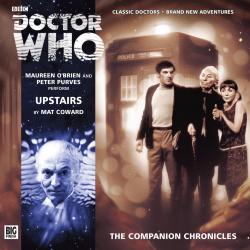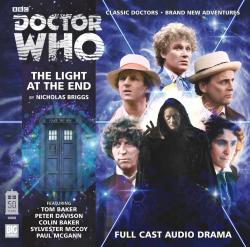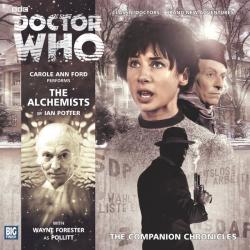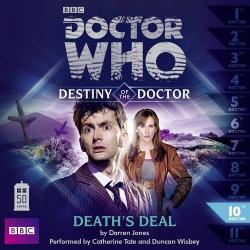The Light at The End was built up for quite some time as the true
Doctor Who fan's 50th. Where many seemed fit to ignore the majority of the show's time, Big Finish, as per usual, decided to do quite the opposite and revel in the past. They wanted to do a proper 8 Doctor story, shattering the previous televised records (which was essentially held by
The Five Doctors, which, despite its name, had about 3 and a half Doctors).
However, this sort of thing had been attempted by Big Finish before with
Zagreus.
Zagreus, for those who are unaware, has something of a rather unfortunate reputation about it. The common narrative surrounding why
Zagreus flopped so immensely was that it simply had too many Doctors and returning cast members. Indeed, for the long-term
Doctor Who fan who defends the upcoming rather New-Who-Centric televised 50th,
Zagreus was always a go-to example for the age-old proverb of
"Too many chefs spoil the broth."Challenging this narrative, however, is
The Light at The End which, thus far, has received a warmer and much more enthusiastic response. The question here is why? Why did this succeed where
Zagreus failed?
Put simply,
The Light at The End understood what it was. It was a celebration of 50 years of
Doctor Who. Where
Zagreus tried to expand upon the universe, in often very interesting ways, it was bogged down by narrative, rather than filled with celebration. When
Zagreus was properly celebrating
Doctor Who, as-in the rather brilliant recasting decisions, it shined. When it went on about exposition and nothing happened, it failed.
The Light at The End fixes this problem. Before we go into this, I should describe what a beat is. In directing and scriptwriting a beat change is a moment when the perspective of a character, or the audience, shifts in relation to a scene. For an example of one of the most famous beat changes in film history, look to
Star Wars Episode V and the infamous
"Luke, I am your father" line. Both Luke and the audience, in this moment, had their perception of events change entirely. Beat changes are directly related to the pacing of a piece and are vital to understanding why
Zagreus failed where The Light at The End succeeded.
In essence, it saw that the core problem with the previous anniversary celebration was that it relied on glacial, or nonsensical, beat shifts. In
Zagreus, the beat shifts never came quickly enough, often relying on people talking and the situation remaining static for huge swaths of time. Likewise, following the intense and emotional beat at the end of
Neverland, the story made a nonsensical shift towards the humdrum as the protagonists trapsed about the TARDIS calmly for an hour. It was jarring and made little sense in context of the previous beat.
The Light at The End has no such problems. The beats come quickly, they land well, and they keep the two hours flying by. It felt dynamic, exciting, and fun. The script is also cleverly edited and every single scene, except one short scene with The Master gloating to himself, has a clear intention and purpose. The script does not waste your time as a listener, which is vital.
But, I'm sure you are all wondering, how the script holds up with so many cast members? Well, this is rather brilliant actually. The various Doctors and companions are split up into teams, much like
The Five Doctors, and each has their own largely separate stories (that come together well at the end). We see about three or four groups form, which by definition makes the vast cast more manageable. However, due to the nature of The Master's plan, the various companions eventually flicker out of existence, delivering a much more manageable cast as time goes on. But, of course, not before delivering some amazing character interaction with some great combinations. Who knew that Charley and Four could get along so well? It's certainly a combination I would never have imagined working. Or what about Ace and Peri? Or, most tragically, Seven and Peri. As the script goes on, the groups form and the companions drop off, so that the cast actually becomes quite manageable with each group having their own basic section that is laden with Doctor-interaction dialogue. Four and Eight were the highlight for me (and a combination I hope to see much more of someday!), but there was plenty here to like. The “too many chefs” argument falls absolutely apart when the chefs are being overseen properly by both an experienced scriptwriter and, more importantly, an experienced editor and director.
It should also be said that there were some other moments of brilliance with the handling of The Doctors and the large cast. Firstly, and most impressively, the first three Doctors actually have rather a large role – with tons of lines! I was incredibly impressed with this, only expecting Big Finish to give them lipservice and some reused lines from their televised time. However, they got a spot-on impersonator for Three, returned
Frazer Hines's Two, and possibly used the wonderful
William Russell as One. The interaction between One, Two, and Three is a joy to see and it's wonderful to see how they interact with some of the later incarnations that they have never really gotten a chance to meet in the past. Secondly, it was nice to use the script to allow some “time bleeding” and enable the other companions that were not featured prominently to have some one-liners. We hear Tegan, Susan, Zoe, Jamie, and plenty of others. Even if it wasn't for long, it was still nice for a celebration to bring them all back for that.
One thing you'll notice in this script is that the script compliments the complications inherent in the casting. Mainly that the script and the story allows for the script to simultaneously expand the cast without allowing it to become unwieldy (the one-liner ghostly visions), while also allowing the cast to shrink and become more manageable as the plot goes on.
That said, the script is also necessarily quite simple in nature. The purpose of the script was not to tell a good story, or even a remotely compelling one, but to celebrate the years and the characters that have made the show what it is. One will not come away from this script thoroughly impressed with the plot as in something like
Jubilee or
Farewell, Great Macedon. The plot is secondary to the celebration here and, in reality, that is precisely what is needed for a good 50th celebration. If one puts too much focus on the plot, as in
Zagreus or likely the upcoming televised 50th, the focus comes away from what made the show great in the first place and the characters that helped craft it. This is the one time of the decade when it is fully appropriate, and even ideal, to look back fondly instead of looking forward. And that's where the script shines. It delivers exactly what is needed – tons of character interaction and lovely combinations of Doctors that we would never get to see any other time of the year. This includes the first time we really get to see Four interact with any other Doctor or companion (
Tom Baker is an absolute joy here, by the way). It's got enough references and returning characters that any long-term fan will be positively thrilled, but it's a simple enough plot that anyone with a basic understanding of who The Doctors are and what their personalities are like will enjoy it as well. For the casual fan and the dedicated one, there's plenty here to enjoy.
Oh, and get the Limited Edition. Trust me – you'll want to hear it all. There's so much content there.
(You can check out more of Lani's Big Finish and Doctor Who reviews at http://who-reviews.com/dwnews)












